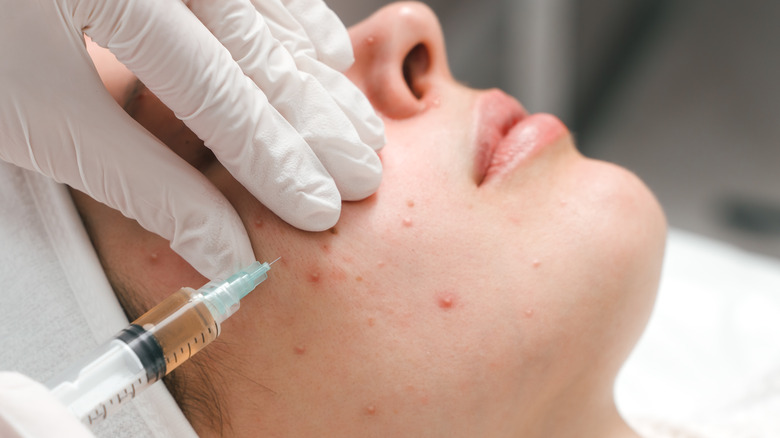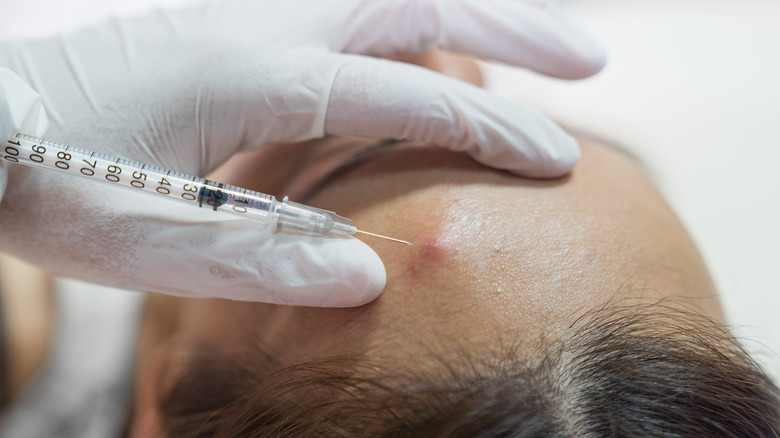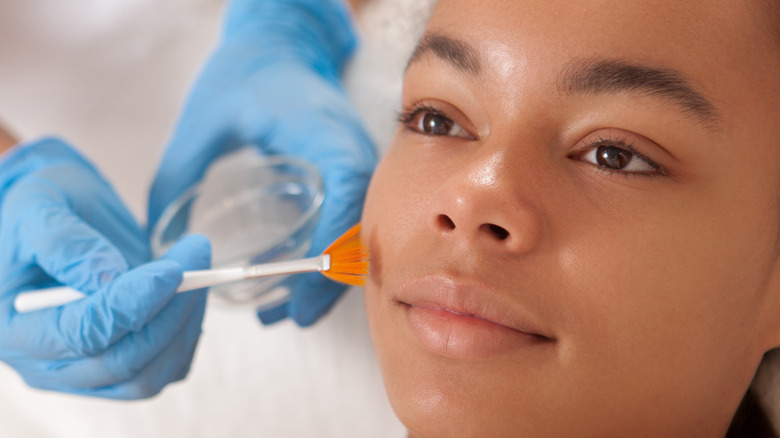How Cortisone Injections Treat Acne
If you have stubborn acne, you have probably tried everything from facial cleansers to supplements to creams and serums. While most people experience acne at some point in their lives, certain types of acne are more stubborn than others. Cystic acne is one type of stubborn acne that can result in cysts deep below the skin. It can be difficult to treat with over-the-counter options and may require treatment in a doctor's office, according to the Cleveland Clinic.
Also called blind pimples, cystic acne usually consists of blocked pores beneath the skin's surface that become clogged with bacteria, dead skin cells, and pus (via Cleveland Clinic). Blind pimples can become inflamed, swollen, and painful. When that is the case, making an appointment with a dermatologist to discuss in-office treatment may be necessary. One such in-office treatment option is cortisone shots, reports Verywell Health. Here is what you need to know about how cortisone injections can treat acne.
Cortisone injections and acne
Cortisone shots are frequently used to reduce inflammation and pain in various parts of the body, including joints, reports the Mayo Clinic. If you experience an especially painful acne cyst, your dermatologist might recommend using a cortisone injection to relieve the inflammation and swelling.
To receive a cortisone shot, you will likely have to make an appointment for an in-office procedure. The shots themselves are usually made up of an intralesional corticosteroid medication used specifically to treat skin conditions, such as triamcinolone acetonide. A local anesthetic may also be included, although your doctor may apply an anesthetic separately (via WebMD). The needles used in intralesional cortisone shots for acne are smaller than needles used for other procedures, such as drawing blood, according to Verywell Health. It is also important to note that while cortisone shots can reduce the inflammation of a painful cyst or nodule, they won't completely clear your skin.
When it comes to treating acne, cortisone injections are typically used in conjunction with other treatment methods, such as topical retinoids, prescription antibiotics, and over-the-counter facial cleansers and topical ointments (per Verywell Health). Salicylic acid and benzoyl peroxide are two ingredients in over-the-counter acne treatments that can help to clear deep cystic acne in conjunction with cortisone injections. In cases of severe cystic acne, isotretinoin or high doses of vitamin A may be recommended by your healthcare provider.
Benefits and side effects of cortisone injections
Cortisone shots can offer immediate relief for excruciating and inflamed acne cysts. If cysts are left to heal on their own, it could take weeks or even months for the painful cysts to go away, but cortisone shots can reduce inflammation in a matter of hours to just a few days (via Verywell Health). Because cortisone injections can help cysts clear sooner, they can reduce the possibility of developing acne scars or dark spots after significant breakouts.
Like all medical procedures, there are side effects that you may experience when getting a cortisone injection. Healthline reports that intralesional cortisone injections used for acne generally consist of steroid solutions that are more diluted than shots used for conditions, such as back pain or arthritis. If the corticosteroid solution isn't diluted enough, however, the skin and tissue around the injection site may thin and develop into a depression, or pitting of the skin. Some craters may go away, but others can also become permanent. Another side effect is hypopigmentation, which is the discoloration of skin and presentation of white spots. Like pitting of the skin, hypopigmentation from cortisone injections tends to go away on its own, but can also persist long-term. As always, consult with your healthcare provider to determine if a medical procedure is right for you.



